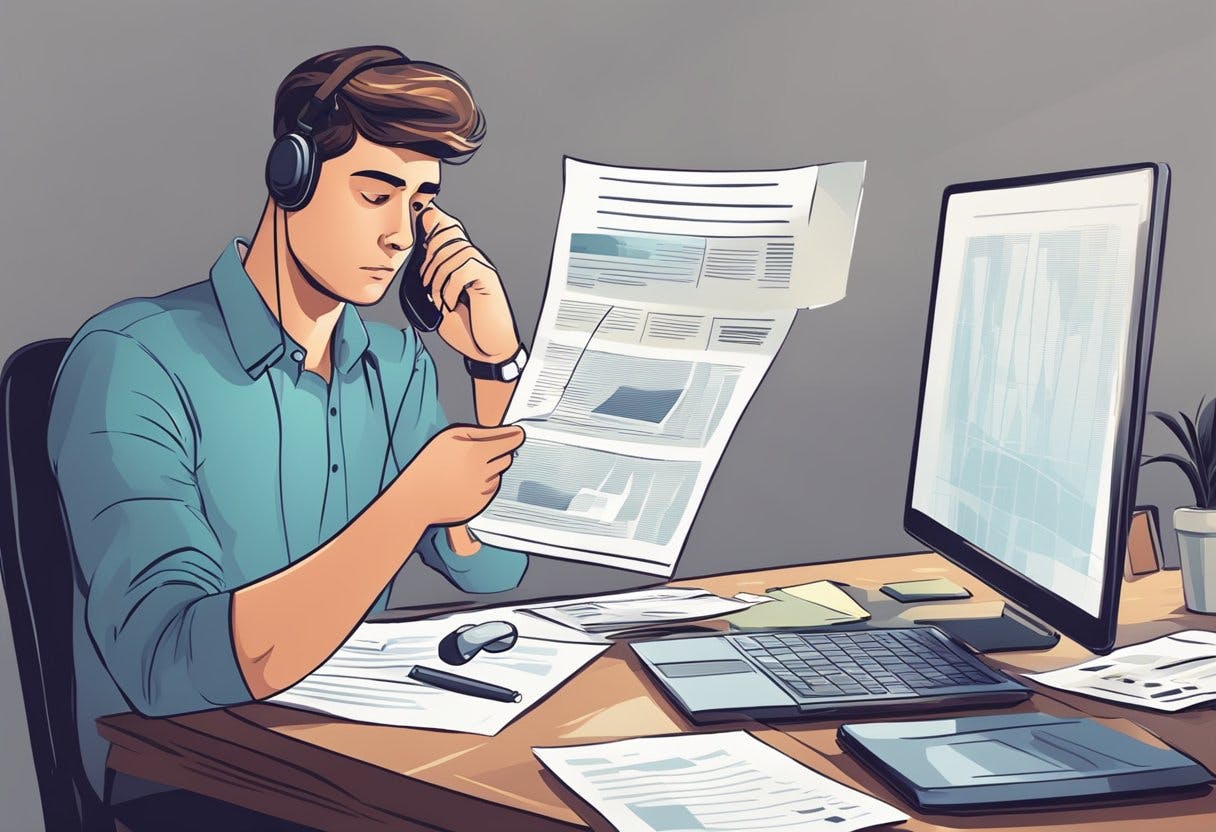
Forex scams have become increasingly common in recent years, with unsuspecting traders falling victim to fraudulent brokers and traders. If you have been the victim of a forex scam, it can be a disheartening and stressful experience. However, there are steps you can take to protect yourself and seek recourse.

The first step is to identify that you have been the victim of a forex scam. This can be challenging, as forex scams can take many forms, including unregulated brokers, clone firms, and social media influencers. Once you have identified that you have been scammed, it is important to take immediate action to protect yourself and your finances. This can include reporting the scam to regulatory bodies, seeking legal recourse, and taking steps to protect yourself in the future.
If you have been the victim of a forex scam, it is important to know your rights and take action to protect yourself. This article will provide guidance on identifying forex scams, immediate actions to take if you have been scammed, seeking legal recourse, engaging with regulatory bodies, and protecting yourself in the future. By following these steps, you can take control of the situation and protect yourself from further harm.
Key Takeaways
- Identify the type of forex scam you have fallen victim to
- Take immediate action to protect yourself and your finances
- Engage with regulatory bodies and seek legal recourse if necessary
Identifying Forex Scams

If you have been the victim of a forex scam, it’s important to know how to identify these scams in the future. Here are some key points to keep in mind when identifying forex scams:
Understanding Forex Scams
Forex scams are fraudulent activities that deceive investors by promising high returns with little or no risk. These scams often involve Ponzi schemes or get-rich-quick schemes that lure investors with false promises.
Recognizing Red Flags
There are several warning signs that can indicate a forex scam. These include:
- High-pressure sales tactics
- Guaranteed returns with little or no risk
- Promises of insider knowledge or tips
- Requests for personal information or money transfers
- Unregistered brokers or firms
Common Types of Forex Scams
There are several common types of forex scams that investors should be aware of. These include:
- Signal seller scams, where a company or individual offers to sell signals that will allegedly help the investor make profitable trades
- Ponzi schemes, where new investors’ money is used to pay off earlier investors
- Robot scams, where a company or individual offers to sell a trading robot that will allegedly make profitable trades on behalf of the investor
- Managed account scams, where a company or individual offers to manage the investor’s account and make trades on their behalf
By being aware of these red flags and common types of forex scams, investors can better protect themselves from falling victim to fraudulent activities.
Immediate Actions to Take

If you have been the victim of a Forex scam, it is important to take immediate action to limit the damage and protect yourself from further harm. Here are some steps that you should take as soon as possible:
Cease All Communication
The first thing you should do is to cease all communication with the scammer. Do not respond to any phone calls, emails, or other forms of communication. Scammers will often try to convince you to send them more money or to provide them with personal information. Do not fall for their tricks.
Secure Personal Information
If you have provided the scammer with any personal information, such as your bank account or credit card details, you should take steps to secure that information. Contact your bank or credit card company immediately and inform them of the situation. They can help you to cancel any transactions and prevent further fraudulent activities.
Report to Relevant Authorities
Reporting the scam to the relevant authorities is important to help prevent others from falling victim to the same scam. Contact your local law enforcement agency or regulatory authorities and provide them with as much information as possible about the scam. Gather any evidence or documentation that you may have and provide it to them as well.
Remember, the internet is a powerful tool for reporting scams, and there are many websites and organizations that specialize in helping victims of fraud. Take advantage of these resources to help protect yourself and others from falling victim to similar scams.
Seeking Legal Recourse
If you have been a victim of a Forex scam, seeking legal recourse may be the best option to recover your losses. This section will provide an overview of the legal process and what you can do to pursue restitution.
Consulting a Lawyer
The first step in seeking legal recourse is to consult with a lawyer who specializes in financial fraud. A lawyer can help you navigate the legal process and provide guidance on the best course of action. They can also help you understand your rights and what options are available to you.
Understanding the Legal Process
The legal process for pursuing restitution for a Forex scam can be complex and time-consuming. It involves filing a complaint with a regulatory agency or consumer protection agency, gathering evidence, and potentially filing a lawsuit against the Forex broker or other parties involved in the scam.
Pursuing Restitution
If you have been the victim of a Forex scam, you may be entitled to restitution. Restitution is the process of recovering your losses from the Forex broker or other parties involved in the scam. This can include recovering funds that were stolen or lost due to the scam, as well as any damages that resulted from the fraud.
To pursue restitution, you will need to work with a lawyer and potentially file a lawsuit against the Forex broker or other parties involved in the scam. This can be a lengthy and complex process, but with the right legal representation, you can increase your chances of recovering your losses.
It is important to note that pursuing legal recourse for a Forex scam is not a guarantee of recovery. However, it is an important step in holding the Forex broker or other parties involved in the scam accountable for their actions and preventing them from defrauding others in the future.
In conclusion, if you have been the victim of a Forex scam, seeking legal recourse may be the best option to recover your losses. Consult with a lawyer who specializes in financial fraud, understand the legal process, and pursue restitution to increase your chances of recovering your losses.
Engaging with Regulatory Bodies
If you have been the victim of a forex scam, it is important to report the incident to the relevant regulatory bodies. Engaging with regulatory bodies can help you recover your lost funds and prevent others from falling victim to the same scam.
Contacting the CFTC and NFA
The Commodity Futures Trading Commission (CFTC) and the National Futures Association (NFA) are the regulatory bodies responsible for overseeing the forex market in the United States. If you are a victim of a forex scam, you should contact the CFTC and NFA to report the incident and seek assistance.
The CFTC has a whistleblower program that provides monetary incentives to individuals who provide information about fraudulent activities in the forex market. By reporting the scam to the CFTC, you may be eligible for a reward if your information leads to a successful enforcement action.
Filing a Complaint with the FCA
If you are a victim of a forex scam in the United Kingdom, you should contact the Financial Conduct Authority (FCA) to report the incident and file a complaint. The FCA is the regulatory body responsible for overseeing the forex market in the UK.
The FCA has a complaints procedure that allows individuals to file a complaint against a firm if they believe they have been treated unfairly. The FCA investigates complaints and takes action against firms that have breached its rules and regulations.
Leveraging the SEC and Other Agencies
If you are a victim of a forex scam in the United States, you may also want to contact the Securities and Exchange Commission (SEC) and other agencies such as the Federal Bureau of Investigation (FBI) and the Department of Justice (DOJ).
The SEC is the regulatory body responsible for overseeing the securities market in the United States. While the SEC does not have direct authority over the forex market, it may be able to take action against firms that have violated securities laws in connection with forex trading.
The FBI and DOJ are law enforcement agencies that investigate financial crimes, including forex scams. By reporting the scam to these agencies, you may be able to help them build a case against the perpetrators and recover your lost funds.
In conclusion, engaging with regulatory bodies is an important step in recovering your lost funds and preventing others from falling victim to the same scam. By reporting the incident and providing information to the relevant authorities, you can help to hold the scammers accountable and protect yourself and others from future scams.
Protecting Yourself in the Future
If you have been the victim of a Forex scam, it is important to take steps to protect yourself from future incidents. Here are some tips to help you avoid being scammed again:
Conducting Due Diligence
Before investing in any Forex opportunity, it is important to conduct due diligence. This means researching the company or individual offering the investment opportunity. Check if they are registered with regulatory bodies such as the Background Affiliation Status Information Center (BASIC). You can also check online reviews and forums to see what other investors are saying about the company or individual.
Understanding Trading Risks
Forex trading involves significant risks, and it is important to understand these risks before investing any money. Learn about the different types of trading strategies and the risks associated with each one. Be aware of the potential for losses, and never invest more money than you can afford to lose.
Choosing Reputable Brokers
Choosing a reputable broker is key to protecting yourself from Forex scams. Look for brokers that are regulated by recognized authorities, such as the Financial Conduct Authority (FCA) in the UK or the National Futures Association (NFA) in the US. Check their track record and read online reviews to ensure they have a good reputation.
In addition to these tips, it is important to stay vigilant and be aware of common Forex scams. These may include promises of guaranteed profits, unsolicited investment offers, and high-pressure sales tactics. By being informed and taking steps to protect yourself, you can reduce your risk of falling victim to a Forex scam in the future.
Frequently Asked Questions
How can I identify if a forex broker is legitimate?
To identify if a forex broker is legitimate, you should check if they are regulated by a reputable financial authority such as the National Futures Association (NFA) or the Commodity Futures Trading Commission (CFTC) in the United States, or the Financial Conduct Authority (FCA) in the United Kingdom. You can also check their website for information on their trading platform, fees, and customer service. Be wary of brokers that promise high returns with little risk, as this is often a sign of a scam.
What steps should I take immediately after suspecting a forex scam?
If you suspect that you have been a victim of a forex scam, you should immediately stop trading with the broker and contact them to request a withdrawal of your funds. You should also report the incident to the regulatory authority that oversees the broker, such as the NFA or CFTC in the United States, or the FCA in the United Kingdom. It is important to act quickly to prevent further loss of funds.
What are the common red flags to watch for in forex trading schemes?
Some common red flags to watch for in forex trading schemes include promises of high returns with little risk, unsolicited phone calls or emails from brokers, and pressure to invest quickly without proper research or due diligence. Other warning signs include brokers that are not regulated by a reputable financial authority, lack of transparency in fees and charges, and poor customer service.
Who should I report to if I’ve been defrauded by a forex broker?
If you have been defrauded by a forex broker, you should report the incident to the regulatory authority that oversees the broker, such as the NFA or CFTC in the United States, or the FCA in the United Kingdom. You can also report the incident to law enforcement agencies such as the Federal Bureau of Investigation (FBI) or the Financial Crimes Enforcement Network (FinCEN).
Are there any legal actions I can take against a fraudulent forex trader?
If you have been defrauded by a fraudulent forex trader, you may be able to take legal action to recover your losses. You should consult with a qualified attorney who specializes in securities fraud to determine your legal options.
What resources are available for victims of forex trading scams?
There are several resources available for victims of forex trading scams, including the NFA’s Customer Protection Fund, which provides financial assistance to customers of NFA-regulated firms who have suffered losses as a result of fraud or other misconduct. You can also seek assistance from the Investor Complaint Center of the Securities and Exchange Commission (SEC) or the Financial Industry Regulatory Authority (FINRA). Additionally, there are several online forums and support groups where victims can share their experiences and receive support from others who have been through similar situations.
Read More




